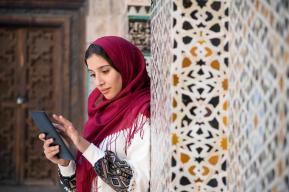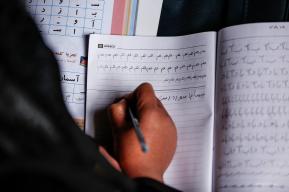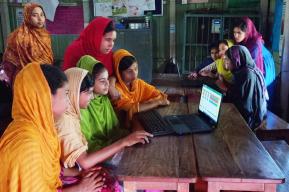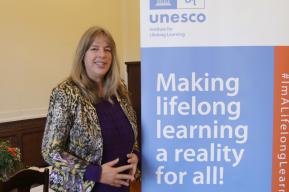
News
International Jury members convene to select laureates of the 2023 UNESCO International Literacy Prizes

On 18 July 2023, the International Jury of the 2023 UNESCO International Literacy Prizes met online to review and discuss over 80 nominations submitted from around the world. The theme for this year's Prizes is "Promoting literacy for a world in transition: Building the foundation for sustainable and peaceful societies.”
Comprising five esteemed experts in the field, the International Jury identified six innovative literacy programmes that have demonstrated exceptional initiatives, going beyond the traditional definition of literacy and contributing to sustainability and peacebuilding. Following the Jury members’ assessment and recommendations, the Laureates will undergo final approval by the UNESCO Director-General.
“Literacy is a top priority for UNESCO. It’s an integral part of the right to education and lifelong learning, and a key driver for sustainable development,” said Stefania Giannini, UNESCO Assistant Director-General for Education during the opening of the meeting. She stressed the significance of this year’s focus on transition and the link to peace, justice, and sustainability, and highlighted the need for radical changes in our thinking, approaches, and action around education and literacy to create a transformative society. She also highlighted the significance of the Seventh International Conference on Adult Education (CONFITEA VII) in Morocco in June 2022, which aimed to make lifelong learning a reality in Member States by prioritizing adult learning on their political agendas.
Criteria for selection process
Among the Jury members, Mr John Benseman, an experienced researcher in adult literacy from New Zealand and Ms Rana Dajani, founder of ‘We Love Reading’ and professor at Hashemite University in Jordan shared their experiences as Jury members since joining in 2019. Three new members were introduced among the five including Ms Mmabaledi K. Seeletso, dedicated to lifelong learning and capacity-building, Ms Yidan Wang, with over 30 years of experience working in education development, and Ms Dong-Eun Lee, a committee member of the National Institute of International Education, promoting education internationalization and Korean language.
Mr Borhene Chakroun, Director of the Division for Policies and Lifelong Learning Systems, guided the Jury members through this year’s theme and introduced the four pillars of UNESCO’s work on literacy development including; supporting Member States in centering literacy within a lifelong perspective; addressing the needs of the most vulnerable groups; leveraging innovation and digital transformation; and monitoring and assessing literacy skills while promoting policy actions towards youth and adult literacy.
The Jury members discussed the criteria they would use in the selection process, including the need of balancing digital learning promotion with peer-to-peer activities and the significance of measuring impact and exploring innovative methods for evaluating the nominated programmes.
Ms Dajani emphasized the importance of local expertise and community involvement for long-term sustainability and innovation and highlighted the correlation between creativity, this year’s theme and the SDGs. Mr Benseman expressed the importance of understanding learners, particularly vulnerable individuals who lack access to the education system, and how programmes can have a real impact on their lives, families, and societies. Ms Lee highlighted the profound impact of initiatives on the community and enhanced the importance of knowing the project’s incentives, and the effectiveness and sustainability of the content. Ms K. Seeletso stressed the connection between promoting literacy and all the SDGs, underscoring the role of literacy in providing access to various aspects of human nature. Finally, Ms Wang expressed delight around the themes of education in rural areas and emphasized the importance of inclusive literacy for vulnerable groups.
Literacy for a world in transition
Literacy empowers individuals, fostering self-esteem, creativity, and critical thinking. It equips people with the knowledge, skills, attitude, and values needed to thrive in a rapidly changing society and economy. Moreover, literacy generates personal benefits, such as improved well-being and economic conditions, while also contributing to broader social, economic, political, cultural, and environmental advancements. To sustain and intensify efforts in promoting literacy for a world in transition and building the foundation for sustainable and peaceful societies, UNESCO chose this theme for both International Literacy Day and the UNESCO International Literacy Prizes 2023.
Since 1967, the UNESCO International Literacy Prizes have recognized excellence and innovation in the field of literacy, aiming to support effective and groundbreaking literacy practices and foster dynamic literate societies. These prizes are instrumental in addressing the global literacy challenges faced by millions of children, youth, and adults, including 763 million individuals lacking basic literacy skills.
The two prestigious International Literacy Prizes include the UNESCO King Sejong Literacy Prize and the UNESCO Confucius Prize for Literacy, which respectively place particular emphasis on mother language-based literacy development and functional literacy, leveraging technological environments, in support of adults in rural areas and out-of-school youth.






